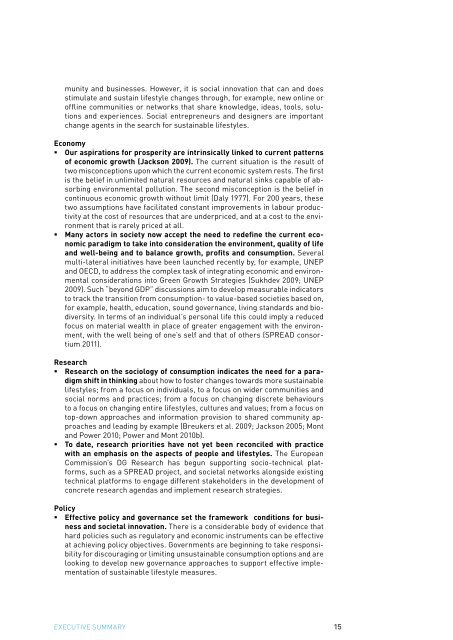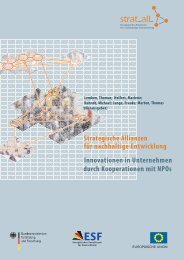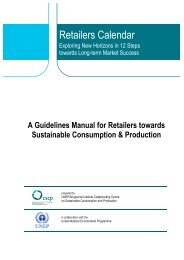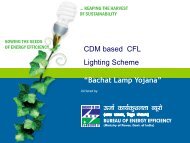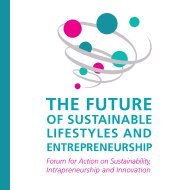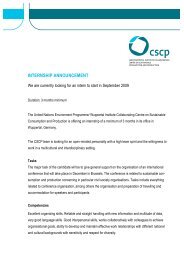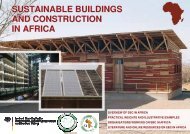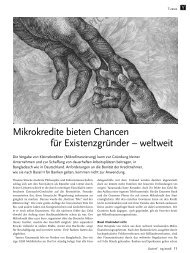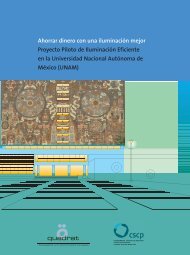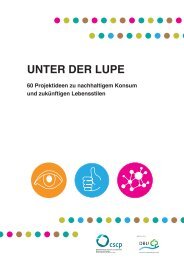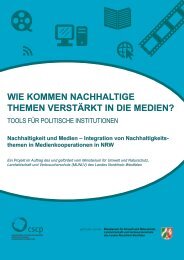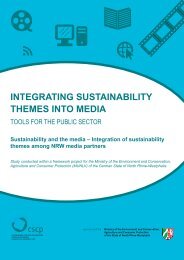today's facts & tomorrow's trends - SPREAD Sustainable Lifestyles ...
today's facts & tomorrow's trends - SPREAD Sustainable Lifestyles ...
today's facts & tomorrow's trends - SPREAD Sustainable Lifestyles ...
You also want an ePaper? Increase the reach of your titles
YUMPU automatically turns print PDFs into web optimized ePapers that Google loves.
munity and businesses. However, it is social innovation that can and does<br />
stimulate and sustain lifestyle changes through, for example, new online or<br />
offline communities or networks that share knowledge, ideas, tools, solutions<br />
and experiences. Social entrepreneurs and designers are important<br />
change agents in the search for sustainable lifestyles.<br />
Economy<br />
• Our aspirations for prosperity are intrinsically linked to current patterns<br />
of economic growth (Jackson 2009). The current situation is the result of<br />
two misconceptions upon which the current economic system rests. The first<br />
is the belief in unlimited natural resources and natural sinks capable of absorbing<br />
environmental pollution. The second misconception is the belief in<br />
continuous economic growth without limit (Daly 1977). For 200 years, these<br />
two assumptions have facilitated constant improvements in labour productivity<br />
at the cost of resources that are underpriced, and at a cost to the environment<br />
that is rarely priced at all.<br />
• Many actors in society now accept the need to redefine the current economic<br />
paradigm to take into consideration the environment, quality of life<br />
and well-being and to balance growth, profits and consumption. Several<br />
multi-lateral initiatives have been launched recently by, for example, UNEP<br />
and OECD, to address the complex task of integrating economic and environmental<br />
considerations into Green Growth Strategies (Sukhdev 2009; UNEP<br />
2009). Such “beyond GDP” discussions aim to develop measurable indicators<br />
to track the transition from consumption- to value-based societies based on,<br />
for example, health, education, sound governance, living standards and biodiversity.<br />
In terms of an individual’s personal life this could imply a reduced<br />
focus on material wealth in place of greater engagement with the environment,<br />
with the well being of one’s self and that of others (<strong>SPREAD</strong> consortium<br />
2011).<br />
Research<br />
• Research on the sociology of consumption indicates the need for a paradigm<br />
shift in thinking about how to foster changes towards more sustainable<br />
lifestyles; from a focus on individuals, to a focus on wider communities and<br />
social norms and practices; from a focus on changing discrete behaviours<br />
to a focus on changing entire lifestyles, cultures and values; from a focus on<br />
top-down approaches and information provision to shared community approaches<br />
and leading by example (Breukers et al. 2009; Jackson 2005; Mont<br />
and Power 2010; Power and Mont 2010b).<br />
• To date, research priorities have not yet been reconciled with practice<br />
with an emphasis on the aspects of people and lifestyles. The European<br />
Commission’s DG Research has begun supporting socio-technical platforms,<br />
such as a <strong>SPREAD</strong> project, and societal networks alongside existing<br />
technical platforms to engage different stakeholders in the development of<br />
concrete research agendas and implement research strategies.<br />
Policy<br />
• Effective policy and governance set the framework conditions for business<br />
and societal innovation. There is a considerable body of evidence that<br />
hard policies such as regulatory and economic instruments can be effective<br />
at achieving policy objectives. Governments are beginning to take responsibility<br />
for discouraging or limiting unsustainable consumption options and are<br />
looking to develop new governance approaches to support effective implementation<br />
of sustainable lifestyle measures.<br />
Executive Summary 15


